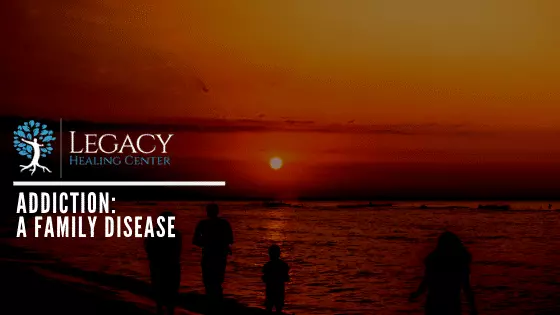
Addiction: A Family Disease
Legacy Healing Center Blog
If you or a loved one has been involved in the recovery community, you have probably heard the phrase, “addiction is a family disease.” This phrase highlights the fact that addiction causes a ripple effect – which affects the family members, friends, and loved ones of an addict.
Addiction involves more than merely drugs and alcohol. It leads to compulsive behaviors, disregard for consequences, and other various burdens that are often placed on the heavy shoulders of an addict’s loved ones. While this concept may be one that is difficult to accept, it is important to recognize that the family of an addict may need to seek professional help in order to heal from their loved one’s addiction.
There is hope!
Download our free Addiction Recovery Guide for Families and learn about addiction, how it’s treated, and how to heal for a more meaningful life.
Family Dynamics of Addiction
Regardless of how healthy and functional a family is, it is important to recognize that the family will always be impacted in one way or another if addiction places its grip on a loved one. If you have experienced addiction in your family, it is no secret that addictive behaviors have an impact on the habits and emotional state of the family as a whole. Family members may begin to use unhealthy coping mechanisms to deal with their emotions, experience physical and emotional discomfort, and neglect their needs in an attempt to control the situation.
Codependency
Codependency is the most common role an individual may assume when dealing with a family member who is affected by addiction. When a person is co-dependent, they tend to disregard their personal needs and sacrifice their time and emotional well-being to place focus on their addicted loved one. It is not uncommon for co-dependents to lose their sense of self and obsessively fear changes in the household.
Characteristics of co-dependent people:
- Feeling responsible for other people’s actions
- Tendency to rescue their loved one from consequences
- Feeling guilty when standing up for themselves or when being assertive
- Difficulty identifying emotions
- Inability to set and keep boundaries
- Lying for their addicted loved one to avoid trouble or confrontation
- Difficulty making decisions
- Fear of abandonment and change
- Low self-esteem
Codependency often leads to enabling. Enabling is anything that helps foster another person’s addiction, such as bailing this person out of jail, driving them to the liquor store to avoid a DUI, giving them money or shelter, and making excuses to cover up addictive behaviors.
Emotional Disconnection
Another way that family members may cope with a loved one’s addiction is through emotional disconnection. Addiction affected families may begin to bury or hide their genuine emotions in order to cope with and deal with situations that may occur.
A person who is emotionally disconnected will be frantically trying to manage something as unmanageable as addiction. They will become extremely organized in coming up with different ways to manage the problem while holding the family together. This person may seem hyper-vigilant and alert while ignoring their true feelings of hurt, fear, and anger. In instances like emotional disconnection, a person may invest a lot of time and energy into the situation while neglecting their physical, mental, and psychological needs.
Attachment Disorders
Children in the family are susceptible to developing attachment disorders. Attachment disorders are characterized by difficulty forming emotional connections with caregivers and family members. Early childhood exposure to addiction increases the risk of developing this type of disorder, and it is a common theme among adult children of alcoholics. Attachment disorders may affect one’s ability to form and maintain meaningful, healthy relationships in the future.
What Can You Do?
As fear, worry, and stress continue to rise while a loved one’s addiction progresses, family members will begin to get resentful at the addict and cope in their own ways. Addiction can cause a family to feel hopeless and defeated. As much as the family would like to see their loved one stay safe and recover, addiction is completely out of both party’s control.
It is important to neither enable nor harass an addicted loved one. Enabling will only allow their addiction to progress and harassment will only infuriate them. Instead, tough love and boundaries should be put in place to protect further emotional damage to the family. If the addicted loved one is willing to get help, the family should be prepared to help them seek treatment. If the addicted loved one would rather continue using, the family should know that this is out of their control.
Regardless of whether or not the addicted loved one is trying to get sober, the family should seek counseling and family therapy to deal with their emotions and struggles in a healthy way. Therapists and addiction specialists can help the family learn how to set and enforce boundaries, practice tough love, understand the disease of addiction, and cope with the multitude of feelings they are experiencing. Addiction is a family disease and should be treated as such. Healing occurs when both the addict and the family seek professional help and guidance to tread through the devastating path that addiction can create.
Mental Health America Co-Dependency
American Academy of Child and Adolescent Psychiatry Attachment Disorders
National Council on Alcoholism and Drug Dependence Family Disease
